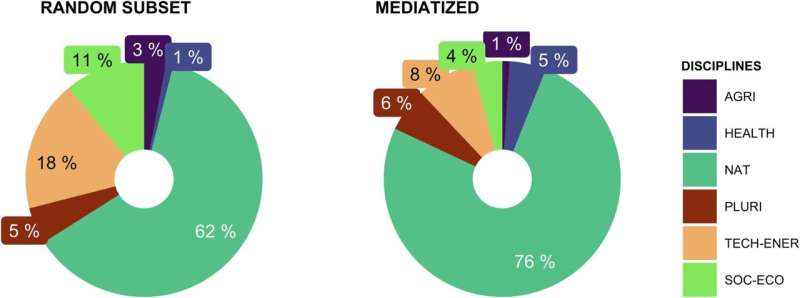Media coverage of climate change research does not inspire action, say scientists

The planet is warming because of human activities and the consequences will be devastating for all living beings, including humans. At present, everyone is potentially exposed this information in the media. But how do scientific journals and the media relay research related to these issues? Is the scientific focus of climate warming research reflected in what the media decided to present?
In a study published in Global Environmental Change, scientists from UNIL specialized in geosciences and psychology have examined these questions. An analysis of the collection of about 50,000 scientific publications on climate change for the year 2020 was carried out to identify what of this impressive body of research made its way into the mainstream media.
The analysis showed that that most of the research selected by the media was biased to the natural sciences. It overly focused on large-scale climate projections that will occur in the future, and a narrow range of threats such as polar bears, drought and melting glaciers. The paper shows that this type of narrative does not activate the mechanisms known from research on psychology that might engage pro-environmental behaviors in readers.
On the contrary, the way the media’s selective choice of certain elements of climate change research could backfire, provoking denial and avoidance.
Presenting the problem, but also the solutions
The study speaks of a possible distancing reaction on the part of the public, resulting from this globalizing approach. “The individuals exposed to these facts, not feeling directly concerned by them, will tend towards a peripheral, superficial and distracted treatment of the information. Only a central, deep and attentive consideration will allow the public to transform what they know into mechanisms of action and commitment,” explains Fabrizio Butera, professor at the Institute of Psychology of the UNIL, and co-author of the study.
Marie-Elodie Perga, professor at the UNIL Institute of Land Surface Dynamics and co-author of the paper adds, “If the goal of mediating research is to have a societal impact, then it seems that we are pushing all the buttons that don’t work.”
Large-scale threats can create fear. But, as Fabrizio Butera reminds us, “research on human behavior shows that fear can lead to behavioral change in individuals and groups, but only if the problem presented is accompanied by solutions.” Faced with purely descriptive articles that emphasize only highly selected elements of climate change, the public will tend to ignore the problem, seek out less anxiety-provoking information and surround themselves with networks that present a more serene reality.
Research, scientific journals and media
What can be done, then, to communicate in an effective, encouraging way, encouraging society to engage more widely in climate protection action? “The treatment of environmental issues in a transversal and solution-oriented way would be useful. It would show that climate change has direct consequences on our lifestyles, our immediate environment or our finances, for example,” says Marie-Elodie Perga.
This approach requires a change in the behavior of communication managers in research institutions, in publishers, as well as in the media. “For the time being, the most renowned scientific publications favor end-of-century studies,” she explains. “Journalists then give very wide coverage to the publications of these journals, which are the most highly rated.”
“Instead, in France, for example, a group of journalists has drawn up a charter advocating the adaptation of media coverage of these issues, and calling for more cross-disciplinarity,” says Marie-Elodie Perga. Isolated, a human being will not have an impact, but collective actions are very effective. There are solutions, but they need to be brought to light, beyond local initiatives.
More information:
Marie-Elodie Perga et al, The climate change research that makes the front page: Is it fit to engage societal action?, Global Environmental Change (2023). DOI: 10.1016/j.gloenvcha.2023.102675
Provided by
University of Lausanne
Citation:
Media coverage of climate change research does not inspire action, say scientists (2023, June 20)
retrieved 20 June 2023
from https://phys.org/news/2023-06-media-coverage-climate-action-scientists.html
This document is subject to copyright. Apart from any fair dealing for the purpose of private study or research, no
part may be reproduced without the written permission. The content is provided for information purposes only.
For all the latest Science News Click Here
For the latest news and updates, follow us on Google News.

